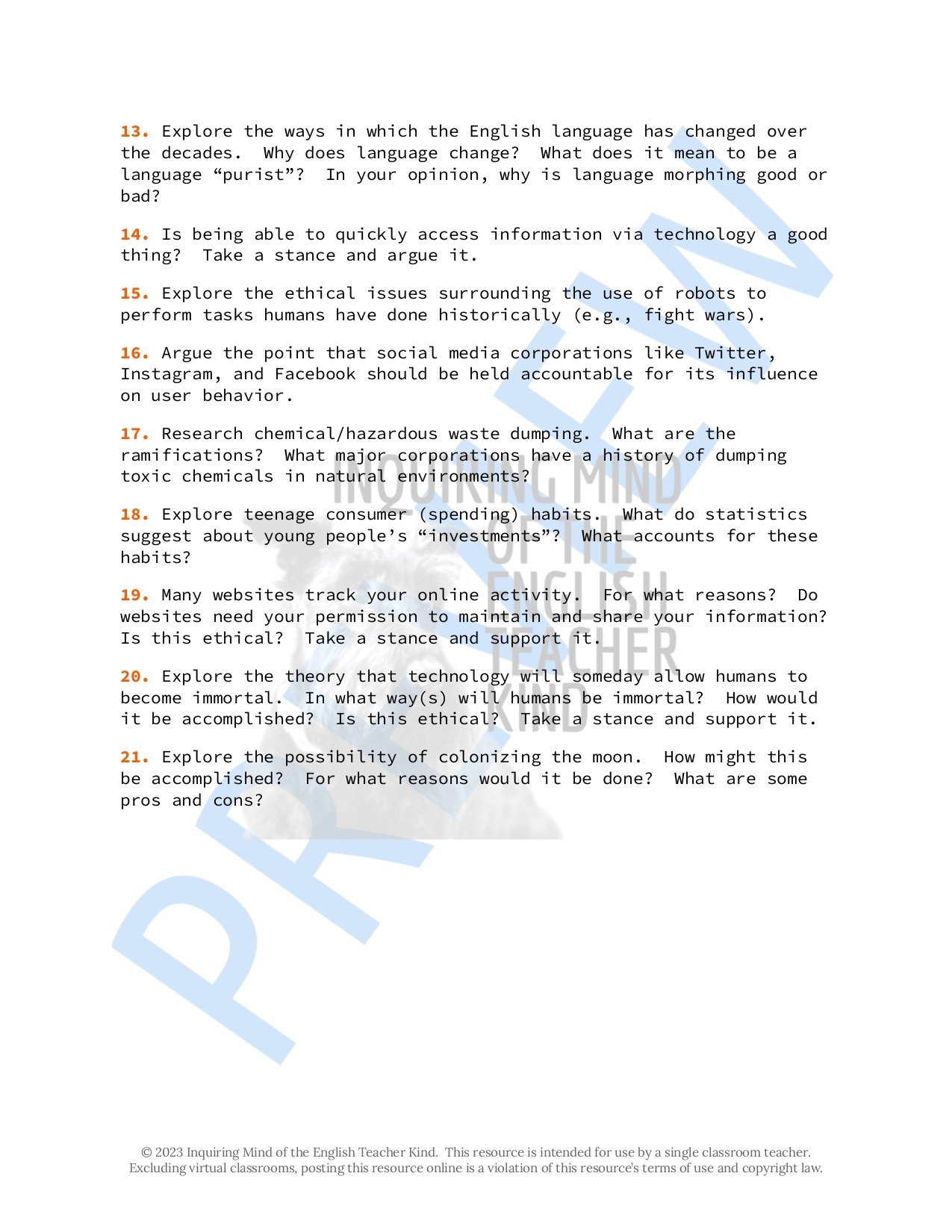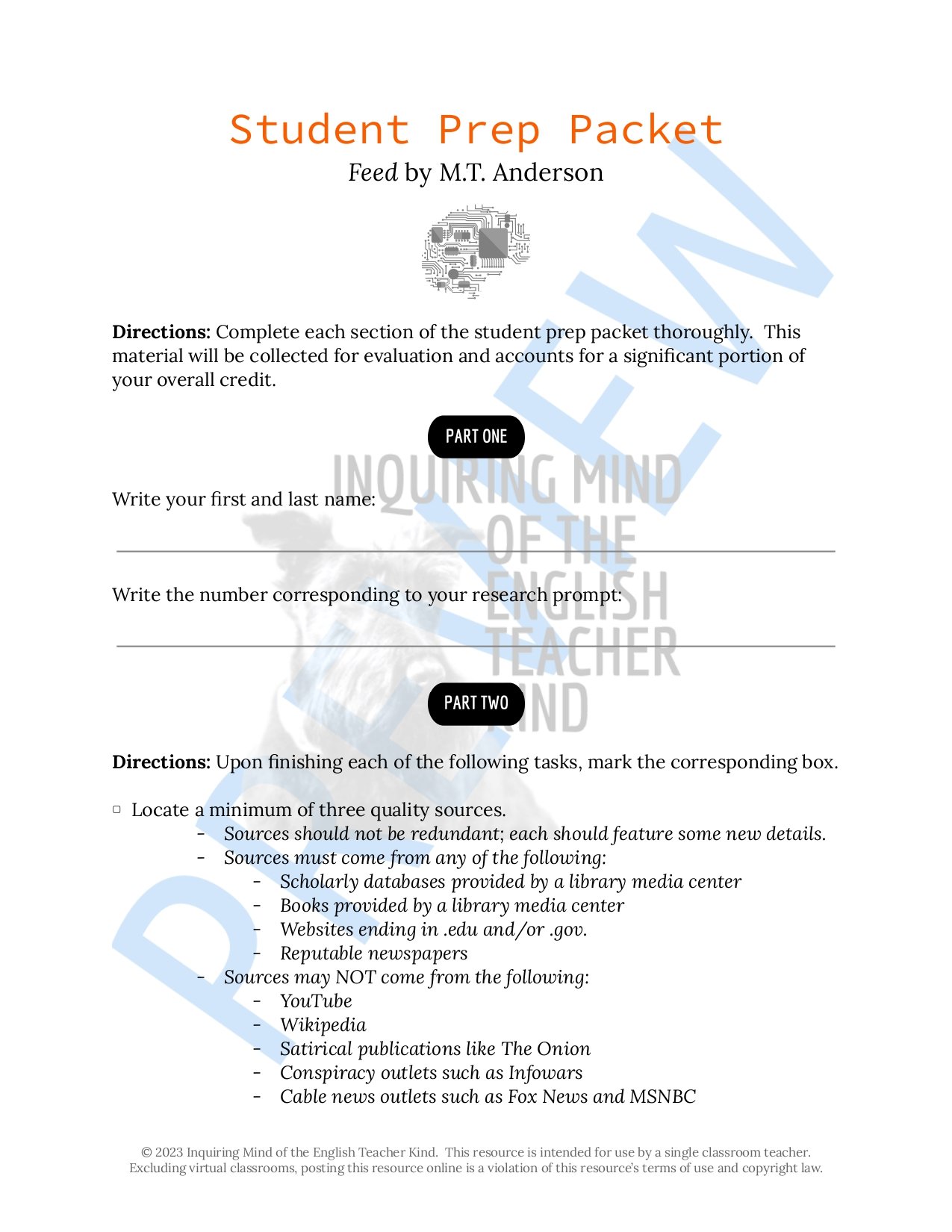 Image 1 of 12
Image 1 of 12

 Image 2 of 12
Image 2 of 12

 Image 3 of 12
Image 3 of 12

 Image 4 of 12
Image 4 of 12

 Image 5 of 12
Image 5 of 12

 Image 6 of 12
Image 6 of 12

 Image 7 of 12
Image 7 of 12

 Image 8 of 12
Image 8 of 12

 Image 9 of 12
Image 9 of 12

 Image 10 of 12
Image 10 of 12

 Image 11 of 12
Image 11 of 12

 Image 12 of 12
Image 12 of 12













Feed by M.T. Anderson Research Project Materials with Standards-Based Rubric
Promote student choice and facilitate the process of researching scientific and societally significant topics from beginning to end with this low-prep, standards-based resource complementing Feed by M.T. Anderson. Students will choose from more than twenty research prompts—addressing ideas such as commercial space travel, genetic engineering, environmental disasters, and the implications of irresponsible social media usage—and navigate academically appropriate sources with the goal of teaching their peers about their topics. A detailed scoring rubric is provided. Materials are delivered in Word Document and PDF formats. (Alternatively, a Google Drive option is available.)
Ultimately, students will perform the following tasks:
Articulate connections between a research topic and the assigned novel
Conduct research using available resources
Collect and classify reliable sources
Develop successful methods of recording information
Evaluate the credibility of nonfiction texts, taking into consideration readability, date, relevance, expertise, and bias
Apply conventions of MLA formatting
Correctly site resources to avoid plagiarism
Organize information in a cohesive manner, using a note-taking system that includes summary, paraphrasing, and quoted material
Analyze, synthesize, and integrate information, generating a thoughtfully comprehensive report, free of generalities and redundancies
Present information in a formal, coherent manner
Materials are available for teaching a variety of young adult and dystopian novels:
Promote student choice and facilitate the process of researching scientific and societally significant topics from beginning to end with this low-prep, standards-based resource complementing Feed by M.T. Anderson. Students will choose from more than twenty research prompts—addressing ideas such as commercial space travel, genetic engineering, environmental disasters, and the implications of irresponsible social media usage—and navigate academically appropriate sources with the goal of teaching their peers about their topics. A detailed scoring rubric is provided. Materials are delivered in Word Document and PDF formats. (Alternatively, a Google Drive option is available.)
Ultimately, students will perform the following tasks:
Articulate connections between a research topic and the assigned novel
Conduct research using available resources
Collect and classify reliable sources
Develop successful methods of recording information
Evaluate the credibility of nonfiction texts, taking into consideration readability, date, relevance, expertise, and bias
Apply conventions of MLA formatting
Correctly site resources to avoid plagiarism
Organize information in a cohesive manner, using a note-taking system that includes summary, paraphrasing, and quoted material
Analyze, synthesize, and integrate information, generating a thoughtfully comprehensive report, free of generalities and redundancies
Present information in a formal, coherent manner
Materials are available for teaching a variety of young adult and dystopian novels:
Promote student choice and facilitate the process of researching scientific and societally significant topics from beginning to end with this low-prep, standards-based resource complementing Feed by M.T. Anderson. Students will choose from more than twenty research prompts—addressing ideas such as commercial space travel, genetic engineering, environmental disasters, and the implications of irresponsible social media usage—and navigate academically appropriate sources with the goal of teaching their peers about their topics. A detailed scoring rubric is provided. Materials are delivered in Word Document and PDF formats. (Alternatively, a Google Drive option is available.)
Ultimately, students will perform the following tasks:
Articulate connections between a research topic and the assigned novel
Conduct research using available resources
Collect and classify reliable sources
Develop successful methods of recording information
Evaluate the credibility of nonfiction texts, taking into consideration readability, date, relevance, expertise, and bias
Apply conventions of MLA formatting
Correctly site resources to avoid plagiarism
Organize information in a cohesive manner, using a note-taking system that includes summary, paraphrasing, and quoted material
Analyze, synthesize, and integrate information, generating a thoughtfully comprehensive report, free of generalities and redundancies
Present information in a formal, coherent manner
Materials are available for teaching a variety of young adult and dystopian novels:
Preview this resource.
Promote student choice and facilitate the process of researching scientific and societally significant topics from beginning to end with this low-prep, standards-based resource complementing Feed by M.T. Anderson. Students will choose from more than twenty research prompts—addressing ideas such as commercial space travel, genetic engineering, environmental disasters, and the implications of irresponsible social media usage—and navigate academically appropriate sources with the goal of teaching their peers about their topics. A detailed scoring rubric is provided.
